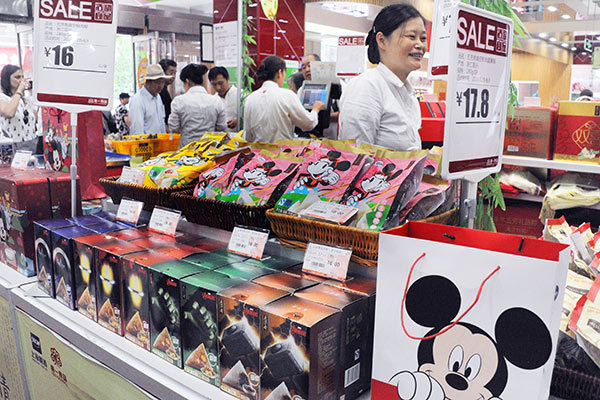Disney's magical attraction makes it a family favorite

 |
| Mickey Mouse makes his mark in a Shanghai food store. The cartoon character was part of a licensing deal to promote snacks.YANG YI/CHINA DAILY |
This creation was part of a licensing deal put together by Walt Disney Greater China and Mobike Technology Co Ltd in August.
The Chinese bike-sharing giant first approached Disney to thrash out a licence agreement about using the company's iconic cartoon characters.
"Ultimately we are a storytelling company," said Luke Kang, executive vice-president and managing director of Disney in China.
The result became an instant topic of conversation in Shanghai and was a publicity coup for Mobike.
Yet this was just another example of Disney's creative team in China.
About 80 to 90 percent of the entertainment group's consumer products in the country are designed and manufactured here.
Based in the United States, Disney has a 42-strong creative crew headed by Allen Au-Yeung.
"Designers have to understand the essence of Disney's stories to better mix the characters with products," said Au-Yeung, creative vice-president of Disney in China.
To illustrate this philosophy, Marvel characters are widely connected with the sports industry because of their power and masculinity.
The creative team has also developed designs which include Chinese features.
Mickey Mouse's collection of Beijing Traditional Cotton shoes is a typical example, with a $200 price tag.
"Disney China has brought Chinese elements to the global stage," Au-Yeung said.
Revenue from licensing deals has become the company's most lucrative business, a report by Licence Global, a publication dedicated to trends in global consumer products, revealed.
Last year, Disney retained its perennial No. 1 spot with $56.6 billion in retail sales of licensed merchandise worldwide, an increase of $4.1 billion compared to the previous year.
In 2105, the rise was $7.2 billion compared to 12 months earlier.
These figures have been fueled by a range of brands, such as the Star Wars franchise, and characters from hit films like Finding Dory, Captain America, Zootopia and Moana.
At Disney's annual licensing convention this year, more than 4,000 licensees and business partners showed up. In 2016, the number was 2,500.
Last year, the world's leading entertainment group sold 15 million T-shirts and 6.5 million mini-sized stuffed toys.
It also provided an estimated 50 million Chinese students with branded products in the back-to-school season.
But then since 2014, Disney's retail sector has seen spectacular growth.
"Whether it is theme parks, consumer products or stores, it is about building an emotional connection and strengthening that connection," Kang, of Walt Disney in China, said.
For licensees, the company's magical connection with consumers holds the key.
The brand is widely loved here and is a safe bet for the right partners, according to Zhang Xin'ai, brand executive of Metersbonwe, a leading fast fashion label in China.
"A lot of the younger generation have a Disney character living in their heart, and they grow up with the magic and dreams," she said.
Known as the Magic Kingdom, the company has strict guidelines protecting its intellectual property rights and a highly efficient permission process.
It took just a month for Metersbonwe to develop and market products from the Beauty and Beast movie.
"Disney's culture is full of fun and is harmless," Zhang said. "Very few people will say they don't like Disney at all."



































